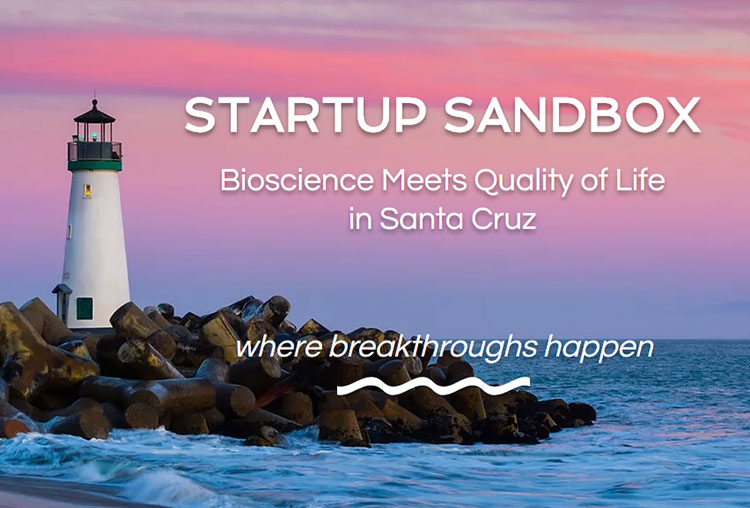By Jondi Gumz
Three biotech companies based at Startup Sandbox in Santa Cruz are working on faster tests for the contagious coronavirus COVID-19, which has caused six deaths in Santa Cruz County and shutdowns that cripple the local economy.
They are competing with others such as Quidel in San Diego and Becton Dickinson in New Jersey, which already have emergency use authorization from the U.S. Food and Drug Administration and produce results in 15 minutes – much faster than the so-called PCR, which require lab processing with a turnaround time at Quest Diagnostics of two to three days, and it has been longer.
- One of the local companies, SanguineDx, was founded in 2010 and is headed by medical device veteran David Sierra of Aptos.
- Another is Ontera, which started out as Two Pore Guys in 2011, raised $32.6 million in funding, and changed names a year ago.
- The third is PinPoint Science, founded in 2017 and headed by Lisa Diamond, a tech veteran who holds two patents for novel molecular diagnostics.
All three made presentations Aug. 5 at the virtual Biotech Startups event hosted by Santa Cruz Works, the nonprofit supporting the local tech community.
David Sierra, SanguineDx CEO, said the company has a patent for its battery-powered pathogen detector based on saliva.
This is an antigen test, and it produces results in less than a minute, he said.
He’s had two rounds of funding and is “in the middle of scaling up manufacturing.”
All the materials for this device are readily available, he said.
That’s a bonus compared to the current COVID-19 test, which requires chemicals that are in short supply worldwide and has slowed local testing down to a crawl.
Sierra said he had started out working on a blood coagulation test six years ago and shifted after seeing a need for COVID-19 testing.
He said testing for the FDA’s emergency use authorization is scheduled for late September or October and he hopes to be on the market by Jan. 1.
Ontera
Mark Rose, who left Google’s Nest division to join Ontera last year as vice president of product management, said Ontera pivoted to work on a point-of-care testing platform for COVID-19.
He said Ontera has “unique sensing technology” that can classify RNA and DNA get results from a nucleic acid sample in 30 minutes.
The test will tell if you have COVID-19 or flu or both, he added.
The process requires a simple nose swab — not the deep nose swab today’s test requires.
The sample goes into a cartridge, which goes into a nanodetector.
“We are working feverishly to get this out in Q4,” Rose said.
He estimated the cost to consumers would be $50-$60.
PinPoint Science
PinPoint Science is working on a point-of-care test for COVID-19 screening, aiming for December 2020, according to CEO Lisa Diamond, with the consumer version to come in 2021.
This will be a handheld device with swappable cartridges to evaluate pathogens using a nanosensor chip, displaying results in 30 seconds on a cellphone or tablet. No chemicals are needed.
The patented technology was invented by Nader Pourmand, UC Santa Cruz professor of biomolecular engineering and PinPoint Science’s chief scientist.
“We’re doing validation in our lab this month,” Diamond said, adding that studies are planned in September at Massachusetts General Hospital.
She said the test would cost $20 at launch.
Her goal is to reach 500 million tests per month, and lower the price to less than $10 per test.
The tests could be used by schools or sports teams, Diamond said.
“It would be amazing to be able to have those,” said Amanda Rotella, a volunteer hosting the Biotech Startups virtual meetup.
Asked why the United States doesn’t have fast COVID-19 tests, which are available in Germany, Rose said, “Germany has a different regulatory environment.”
Diamond added, “There’s a cautiousness from the federal government on novel technologies.”
Rapid tests at the doctor’s office or urgent care center, bypassing the need for lab equipment, were pushed aside initially in favor of the PCR lab tests, which are more accurate. However, with a global shortage of the chemical needed to run the lab test and lengthy delays to get lab test results, some, including Harvard University epidemiologist Michael Mina and UCLA Health System pathologist Omai Garner, welcome faster tests, even if they are not as accurate, as a way of mitigating outbreaks.
Lou Pambiano, Startup Sandbox CEO, said three Sandbox startups — PinPoint, SanguineDx and Incisive RNA, are being assessed by the Gates initiative.
“The private sector is rushing into opportunities for testing and treatment,” he said.
He has 40 companies in the Sandbox, an incubator with a wet lab at 250 Natural Bridges Drive, Santa Cruz, to help startups grow.
“This is a phenomenal time to start a company,” Rose said, explaining that “larger companies are less likely to take risks, gives a lot of oxygen for startups to start and thrive.”
Doug Erickson, executive director of Santa Cruz Works, said, “It’s really fantastic to see what you’re doing.”
Other biotech presenters included:
- Mark Coates of CITO Medical, founded in 2010, helps bring ideas from a sketch on a napkin to production, competing with Frog Design and IDEO. Most of the client names are confidential but they include Abbott Lab and Cepheid, who got FDA approval for a point-of-care diagnostic for the Xpert Xpress SARS-CoV-2 test, and Abbott Laboratories. Information: mark.coates@citomedical.com
- Kelly Harkins Kincaid, CEO at Astrea Forensics, which has a technique to recover DNA from hair, which can be used to solve cold crime cases. Co-founder is Ed Green of the UC Santa Cruz paleogenomics lab. The company, launched in 2019, is hiring.
- Cameron Pye, co-founder and CEO of Unnatural Products, a 2017 startup working on “unlocking undruggable targets.” Information: cam@unp.xyz
•••
For more information see www.santacruzworks.org and www.startupsandbox.org.

